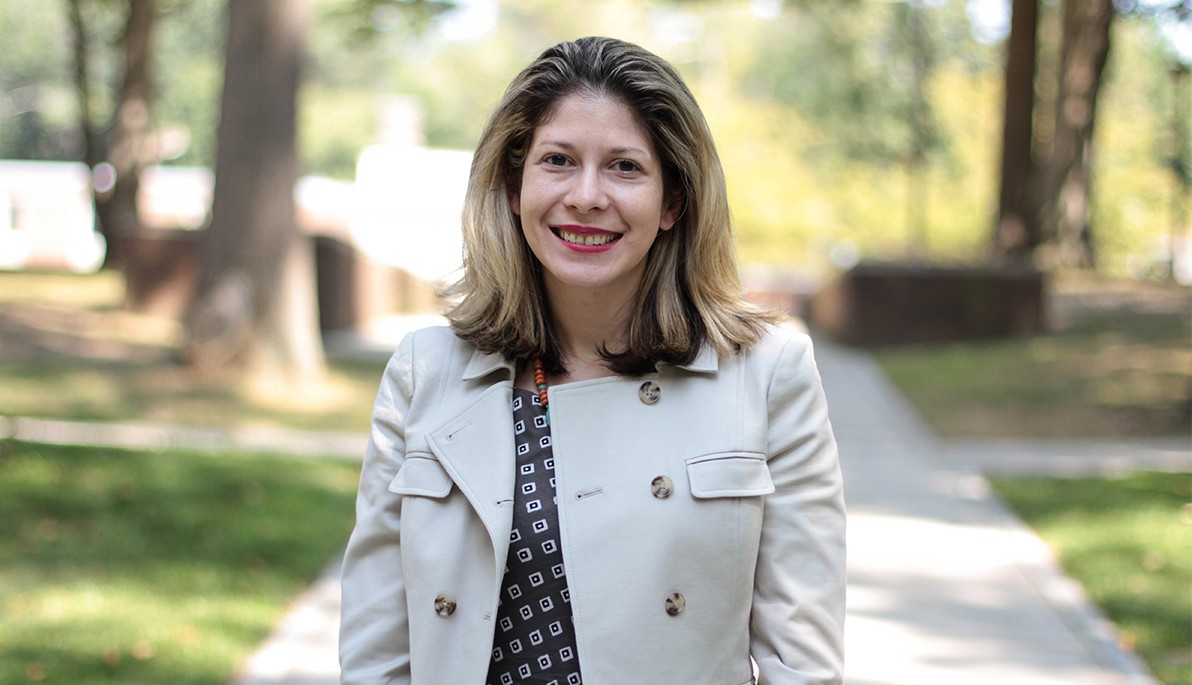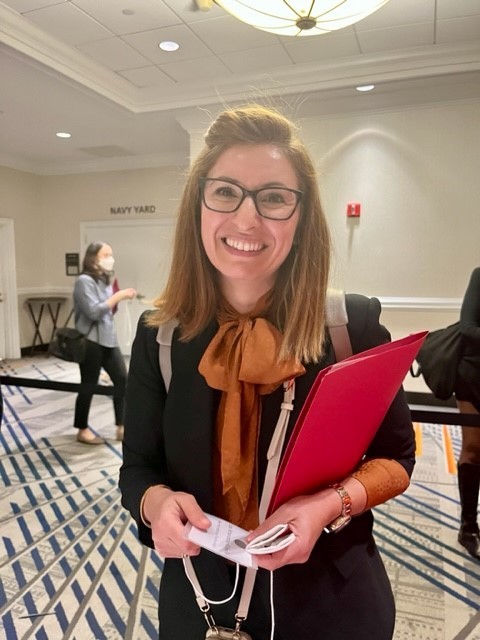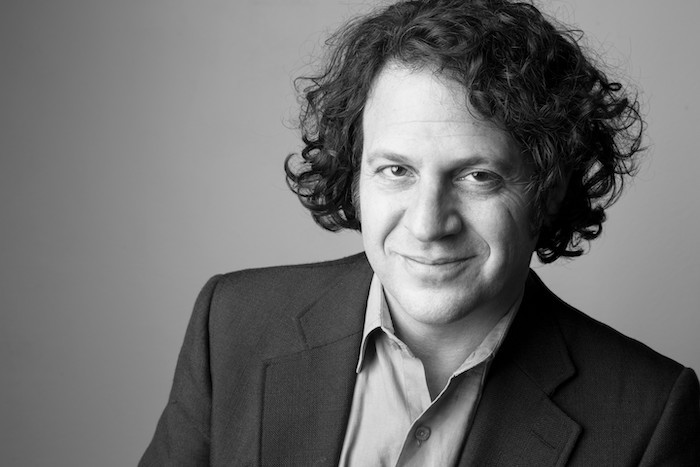
Faculty Participate in Modernist Studies Association Conference
November 9, 2023
Pictured: Associate Professor Amanda Golden, Ph.D., volunteered to serve on the local organizing committee for the Modernist Studies Association conference. The event drew more than 700 attendees.
Amanda Golden, Ph.D., associate professor and director of writing, has been attending Modernist Studies Association (MSA) conferences since her days as a graduate student in 2004.
The MSA is a leading international, interdisciplinary academic organization that has held conferences for more than 20 years. Modernism refers roughly to literature, art, and culture of the first half of the 20th century, as well as work throughout the 20th century. In recent years, the MSA has made a point of making its work in historical research and cultural criticism specifically address society’s contemporary concerns about race, ethnicity, and gender.
Over the years, Golden presented at the conferences and was published in the association’s journal, Modernism/modernity. When the opportunity arose to hold a conference in Brooklyn, she volunteered to serve on the local organizing committee with Patrick Deer, associate professor at New York University; Matthew Hart, professor at Columbia University; and Nico Israel, professor at Hunter College, CUNY Graduate Center. The group also worked with a larger steering committee of faculty from CUNY, Fordham University, Manhattan College, Sarah Lawrence College, Stony Brook University, and other institutions.
The conference was held on October 26 through 29 and drew more than 700 participants.
Golden sat down with New York Tech News to talk about the experience and the university’s involvement.
Can you talk about the theme of the conference—Streets—and what you hoped to achieve at this year’s gathering?
The theme sought to speak to New York’s landscape and the range and diversity that streets introduce, from transportation to activism, in literature, art, and culture. It was a way to engage the city’s landscape and the ways that the streets are sites of change from the first half of the 20th century to the present day. The theme appealed to us because we set out, from our first meetings, to make this edition of the MSA’s annual meeting the most inclusive and diverse it had ever been, both in terms of the range of topics covered and in terms of the diverse personal and professional backgrounds of the participants.
The Streets theme also enabled the formation of five interdisciplinary program streams by steering committee members, “Environmentality In and Beyond the Modern,” “Harlem as Hub,” “Modernism across the Disciplines,” “Precarity and Public Life,” and “Street Access.” The streams included panels, roundtables, and seminars and invited sustained conversations about vital topics in the field, including disability studies, gender, race, and sustainability.
We also held two plenary events addressing different dimensions of the conference theme. Daphne A. Brooks, who is the William R. Kenan, Jr. professor of African American Studies, Women’s Gender, and Sexuality Studies, and Music at Yale University, gave the plenary lecture, “This Wretched Enchantment: The Gershwins & the Heywards, Toomer & Hurston and the Modern Black Womanhood Problem” Additionally, a Night Life/Street Life plenary roundtable, moderated by New York Tech Professor Jonathan Goldman, Ph.D., featured presentations from Juno Jill Richards (Yale University), Hugh Ryan (writer, historian, and curator), Sukhdev Sandhu (New York University), and Sunny Stalter-Pace (Auburn University).

Associate Professor Lissi Athanasiou-Krikelis, Ph.D., led the “Metafiction, Autofiction, and Other Metanarrative Forms of Storytelling” seminar.
New York Tech Associate Professor Lissi Athanasiou-Krikelis, Ph.D., also participated. How did she and Jonathan Goldman get involved?
Jonathan Goldman is a well-known modernist scholar and has been an active member of the Modernist Studies Association for over 20 years; it was inevitable that he would be involved. He and I became involved from the start of the planning process for the conference. I served on the local organizing committee as co-chair, and he was on the larger steering committee. Lissi Athanasiou-Krikelis is a scholar of twentieth and twenty-first-century literature, and her workmade her an ideal seminar leader.
Are students allowed to participate in the conference? If yes, did any New York Tech students attend, and did they take an active role or attend any of the sessions?
Over the summer, I was thrilled to work with Lizzie Belnap (B.A. ’19), a current Ph.D. student at Stony Brook University, who provided invaluable assistance with the conference program. They studied James Joyce with Dr. Goldman and took classes with English faculty members, including Dr. Athansiou-Krikelis and me.
You led a few sessions. Can you briefly tell me what they were about? How did they tie into the theme of the conference?
I co-organized a seminar called “Electrifying the Streets” with Assistant Professor Heather A. Love of the University of Waterloo (author of Cybernetic Aesthetics: Modernist Networks of Information and Data). It brought together scholars interested in modernism and technology who circulated papers in advance that we discussed at the conference.
I also planned a publishing workshop and an excursion to the Brooklyn Museum. The workshop was open to all conference attendees, from those working on a dissertation or a first book to those who have published several books. Publishers discussed crafting book proposals and current topics, trends, and publication series information for modernist scholars
As a local organizing committee co-chair, I also served on the program committee, worked with the local organizing committee co-chairs to develop the program, promoted the conference on social media, and answered conference emails.

Professor Jonathan Goldman, Ph.D., presented a paper, “The Sheik of Amerikay: Whiteness in The Great Gatsby,” and moderated the Night Life/Street Life plenary roundtable.
Can you talk about Lissi Athanisou-Krikelis and Jonathan Goldman’s sessions?
Athanisou-Krikelis’s seminar was on “Metafiction, Autofiction, and Other Metanarrative Forms of Storytelling.” Athanasiou-Krikelis is co-editing The Routledge Handbook to Metafiction, and the seminar served as a platform to locate potential contributors and for committed contributors to test their ideas. Fifteen scholars participated, deliberating upon the distinction between metafiction and autofiction and the terms’ connection to postmodernism. The discussion explored various aspects of self-reflexive novels, some pseudo-autobiographical.
Professor Goldman presented a paper, “The Sheik of Amerikay: Whiteness in The Great Gatsby,” about how F. Scott Fitzgerald’s classic novel made use of popular culture and participated in expanding notions of whiteness in the 1920s—exactly the kind of work relevant to current cultural concerns that this conference, with its diversity, equity, and inclusion emphasis, was encouraging.
The conference was originally planned for 2020, then the pandemic hit. What challenges did you face in reorganizing the event?
We began planning the conference in 2018 and had to reassess after it was postponed in 2020. Some of the work we were doing then was so timely that we held a few key sessions remotely in the fall of 2020, but then we rebooted and planned an entirely new conference. It made for six years of planning and collaboration.
Why is it important for New York Tech to have a presence and lead discussions at this conference?
Modernist studies is a vibrant, diverse field that brings together literary and cultural experiments. Technology is an essential part of these conversations. This is important work for faculty in the humanities to engage in as New York Tech implements its strategies to attain R2 status. The first half of the 20th century brought immense change in literature, architecture, film, music, and the visual arts that have had a lasting impact on our understanding of the world. Recent digital scholarship, such as Professor Goldman’s New York 1920s project, has also altered considerations of modernism and the ways we study the past.
This interview has been edited and condensed.
More Features

An Alumnus’ Commitment to the Environment
As an energy management graduate from New York Tech’s Vancouver campus, Jasdeep Gulati (M.S. ’22) is highly invested in educating people about environmental and climate sustainability.

Vancouver Faculty Win University-Sponsored Research Awards in New Program
The new Global Impact Research Grant (GIRG) program has been developed to keep Vancouver-based faculty connected to faculty and research projects being conducted on the university’s New York campuses.

Studying Climate Change One Degree at a Time
Junhua Qu (M.S. ’24) began her collegiate journey in Beijing. But, her interest in climate change took her to New York Tech’s Vancouver campus to study energy management.